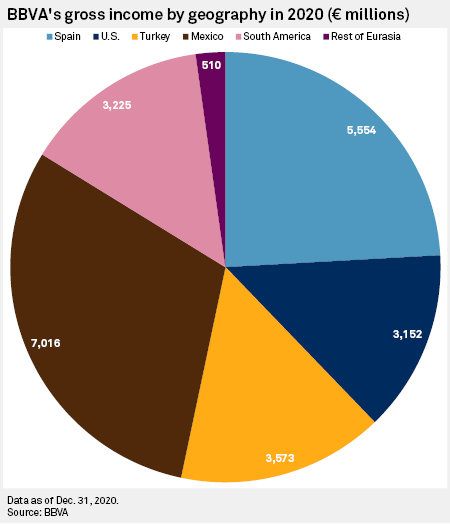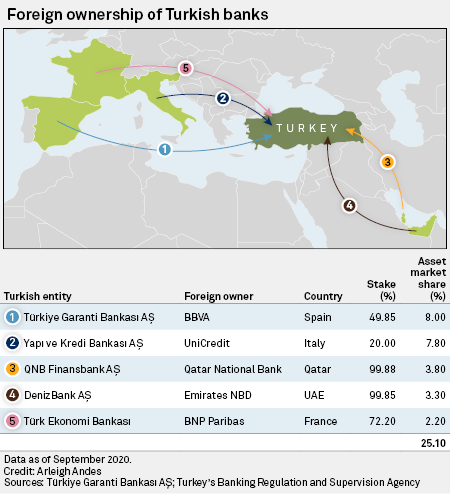Turkey's benchmark bank index traded more than 9% lower on Tuesday as markets reacted to Turkish President Recep Tayyip Erdoğan's surprise dismissal of the central bank governor.
The sacking of Naci Ağbal at the weekend sparked widespread selling of local stocks and the lira, with bank shares among those to take a hit. The Borsa İstanbul AS's Liquid Banks index, which includes Türkiye İş Bankası AŞ, Türkiye Vakıflar Bankası TAO, Türkiye Halk Bankası AŞ, Akbank TAŞ, Yapı ve Kredi Bankası AŞ and Türkiye Garanti Bankası AŞ, closed 9.89% lower on Monday at 1,206.37, and had fallen to 1096.03 at noon Istanbul time on Tuesday.
Garanti's parent company Banco Bilbao Vizcaya Argentaria SA closed 8.7% lower on Monday. The Spanish lender's Turkish operations accounted for 16% of group gross income in 2020.

"The issues in Turkey have been long running. This is one in a line of volatile issues in Turkey that have come up in recent years," Benjie Creelan-Stanford, bank analyst at Jefferies, told S&P Global Market Intelligence. "From a BBVA perspective specifically, the things to bear in mind are that the subsidiary is self-funded and the capital sensitivity of the group is reasonably limited in that there is a natural hedging in place but they do actively hedge [foreign exchange] risk as well."
"For what it's worth, in terms of our assumptions, we are embedding conservative forecasts going forward for Turkey because of those aforementioned risks, in terms of the underlying fundamentals and also the currency assumptions that we are using. We have Turkish profits down 20% in 2023 versus 2020 for BBVA," he said.
BBVA, along with UniCredit SpA, ING Groep NV and Qatar National Bank (QPSC), are among foreign lenders with Turkish assets.

The lira was at 7.78 to the U.S. dollar on Tuesday, paring losses after trading at 8.39 to the dollar over the weekend, though the lira's renewed slide takes its losses versus the dollar over the past decade to about 80%.
Erdoğan replaced Ağbal with Şahap Kavcıoğlu on Saturday, which followed Thursday's 200-basis-point increase in the benchmark interest rate to 19%.
"You cannot change the central bank governor from a hawkish one to a dovish one without markets expecting a fundamental policy shift," said Per Hammarlund, chief emerging markets strategist at Sweden's SEB.
"Unless the central bank issues a credible statement committing to using interest rates to fight inflation and to stabilize the lira, the 8.51-8.52 [to the dollar] level will be tested if not in the next couple of days then within the next couple of weeks."
Hammarlund believes the government and central bank are taking measures to support the lira such as using the swap market to buy lira and pressuring state-owned banks to buy lira and sell dollars.
"They don't have much in reserves, so their ammunition is very low, and they can only do this for a short period," he said.
Unorthodox views
Erdoğan appointed Ağbal in November 2020, firing his predecessor after the lira fell to a record low versus the dollar. Ağbal's replacement, Kavcıoğlu, is an economist and former member of parliament for Erdoğan's AK Party, according to the state-run Anadolu Agency. In February he wrote a newspaper column in which he claimed rate hikes indirectly cause inflation to rise, Daily Sabah reported. That view, which is contrary to conventional economic thought, is one Erdoğan has touted himself.
"It appears that no more rate hikes are on the horizon for Turkey," said Jeffrey Halley, a senior market analyst at currency exchange firm Oanda.
As investors sell off their Turkey assets, Halley warned Kavcıoğlu's appointment would "choke off" foreign investment flows, thereby raising domestic borrowing costs even if the central bank does not hike rates.
Should Turkey fail to raise rates further, the country "will either have to burn through its currency reserves to defend the lira, as foreign investors will look at the developments negatively, or new currency controls are on the way," said Halley.
Inflation targets
Kavcıoğlu, in a written statement, said the regulator's main objective was to achieve a permanent lowering of inflation.
In response to the pandemic, Turkey's central bank slashed interest rates to 8.25% in May 2020, extending cuts from mid-2018's peak of 24% and introducing various measures to better support the ailing economy.
These rate reductions prompted corporate and individual customers to increase their borrowing, with state banks especially aggressive in expanding their loan books under Turkey's Credit Guarantee Fund.
But the central bank then hiked rates — to 10.25% in September, 15.0% in November and 17% in December before last week's latest increase — which sapped demand for new loans but bolstered the lira.
The central bank had hiked rates to try to control inflation. Annual inflation hit 15.6% in February, its highest level since mid-2019. Food prices were up 18.4% year over year. Annual inflation is forecast to fall to 10.5% in March.



